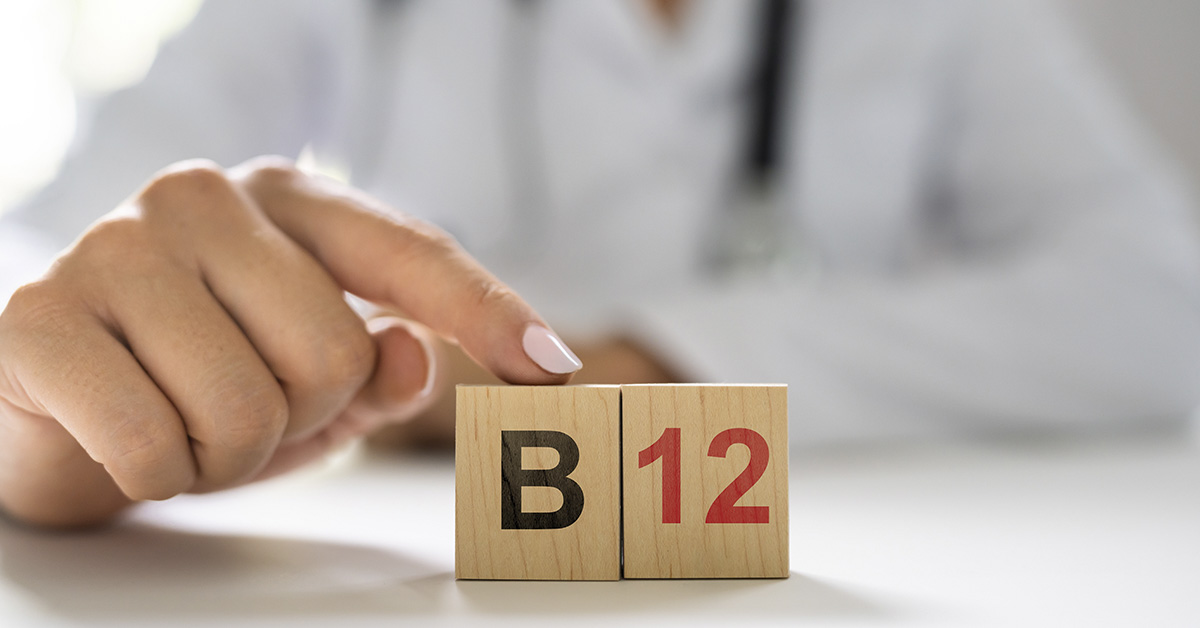Vitamin B12 is an important vitamin for our bodies. It is involved in many important functions for energy, our brain, and other important organs and systems. Having low levels of this vitamin can have a devastating impact on your health. If you’re concerned that your vitamin B12 levels are too low, there are a few warning signs to look for in your mouth.
The Warning Signs of Low Vitamin B12 Can Be Found In Your Mouth

If you are suffering from low levels of vitamin B12, it can have a devastating impact on your health. There are some signs that you should look for in your mouth if you think that you may have low B12 levels. The technical terms for what you may experience are glossitis, glossodynia, recurrent ulcers, cheilitis, dysgeusia, lingual paresthesia, burning sensations, and pruritus. What this looks like, typically, is a sore mouth. Your tongue may be swollen or have painful ulcers, it could be white, or it could be red and swollen.
You also might find yourself with chapped lips. (1, 2, 3)

If you find yourself experiencing these symptoms, you should go speak with your doctor. If it is a vitamin B12 deficiency, they will likely prescribe supplements and/or dietary changes to bring your levels back up. These symptoms can be indicative of other health problems, as well, so you’ll want to make sure that whatever it is, you get it taken care of.
What Is Vitamin B12?

Vitamin B12 is a water-soluble vitamin that is naturally found in meat and dairy products. It helps with the production of red blood cells, which carry oxygen throughout your body. It also helps to make DNA and RNA, which are important for cell growth and repair. Vitamin B12 is important for brain function, as well. It helps with memory, mood, and cognition in general.
What Health Problems Can Vitamin B12 Deficiency Cause?

Vitamin B12 deficiency can lead to a number of health issues, from anemia to nervous system damage. It is especially important for pregnant women because it helps prevent birth defects like neural tube defects that affect the spinal cord. It also helps prevent developmental problems in children, like autism and ADHD. If you’re not getting enough vitamin B12, you may experience the following symptoms (4):
- Anemia (low red blood cell count)
- Weakness or fatigue
- A sore tongue or mouth sores (also known as glossitis)
- Dizziness or lightheadedness
- Numbness or tingling in the hands and feet -Constipation
- Changes in mood, like depression or confusion
Read: Why Up to 80% of Us are Deficient in Magnesium
What Might Cause B12 Deficiency?

There are many reasons why our bodies may not be able to absorb enough vitamin B12 from our food sources. A common cause of low absorption is pernicious anemia, which occurs when the body stops producing enough stomach acid to break down and absorb nutrients from food. This condition can lead to many other health problems, including heart disease and Alzheimer’s disease. Another reason for low levels could be the use of certain medications like aspirin or antacids (over-the-counter), which can interfere with how well the stomach breaks down food so that it can be absorbed by the body.
Other common causes of low levels include aging and a diet that is lacking in certain foods. The reason for this is that vitamin B12 is found mainly in fish, meat, poultry and dairy products. This means that vegetarians are more likely to be deficient in this nutrient than people who eat meat regularly.
Food Sources of Vitamin B12

Thankfully, there are plenty of ways to get more vitamin B12 in your diet. Consuming foods that have been fortified with this nutrient like breakfast cereals and soy milk can help to boost your intake. Other good sources of vitamin B12 include:
- Liver
- Shellfish (like mussels and clams)
- Seafood like salmon, tuna and sardines
- Eggs (especially the yolk)
- Milk and other dairy products
- Meat (especially beef)
- Cheese (including hard cheese)
- Nuts and seeds
- Fortified breakfast cereals
- Soy milk
- Vegetables like asparagus, broccoli and spinach
As already stated, if you are suffering from a serious deficiency, your doctor will prescribe supplementation. This could be in the form of an oral supplement, however, it could be vitamin B12 injections. This is necessary when the cause of the deficiency is stomach absorption problems.
The Bottom Line
Vitamin B12 is critical for health and longevity. It is important that you make sure you are consuming enough foods that contain the vitamin, especially if you are vegan or vegetarian, in which case this will be more difficult. Have regular check-ups with your doctor to make sure your levels are good. If you notice any of the symptoms of deficiency, talk to your doctor and request a blood test. The earlier you catch deficiency and start treating it, the better the outcome will be.
Keep Reading: Massive Study Shows Vitamin D Supplements May Help Fend Off Dementia
Sources
- “Oral manifestations in vitamin B12 deficiency patients with or without history of gastrectomy.” NCBI. Jihoon Kim, Moon-Jong Kim, and Hong-Seop Kho. May 27, 2016.
- “9 Signs and Symptoms of Vitamin B12 Deficiency.” Healthline. Jillian Kubala, MS, RD. December 22, 2021.
- “Can Vitamin Deficiencies Cause Chapped Lips?” Healthline. Rachael Ajmera, MS, RD. April 14, 2020.
- “Symptoms-Vitamin B12 or folate deficiency anaemia.” NHS

